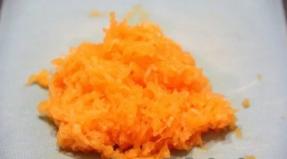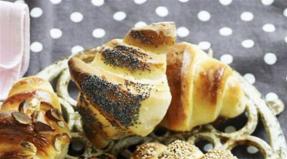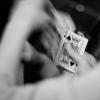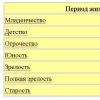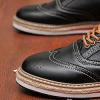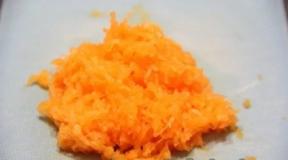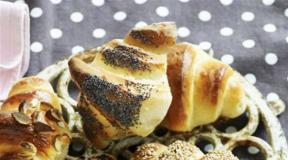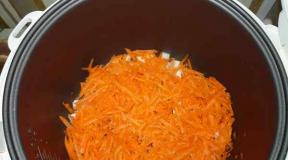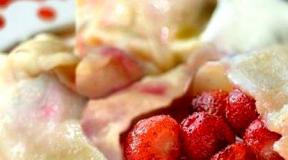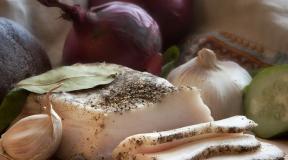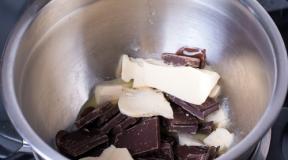Is it possible to take blessed eggs to a cemetery? What is the effect of an egg buried in a grave?
Easter is one of the most beloved holidays for Russians, second in popularity only to New Year. On Bright Sunday of Christ, almost everyone breaks their fast, makes Christ and eats Easter cakes - regardless of how strictly a person observed all the Orthodox canons preceding this day, and whether he observed them at all. According to Secretary of the Kursk Diocesan Administration Father Oleg Chebanov, the reason for such popular love lies in the fact that “there are things that we understand with our minds, and there are those that we reach with our hearts.” “It is no coincidence that Easter is called the Feast of Feasts and the Celebration of Celebrations. In spirit we always strive upward - towards God, therefore in the soul any person feels that Easter is the most important holiday, evidence of the victory of life over death,” the priest noted.
True, opinions on how to properly celebrate this holiday differ greatly. Some, for example, argue that you should never go to the cemetery on this day, while others, despite all these conversations, go there every year. Some people believe that only those who have fasted can break their fast on Easter morning. Others, without fasting, nevertheless organize real feasts. So what can and cannot be done on Easter? Father Oleg Chebanov spoke about this.
Is it necessary to visit a cemetery on Easter?
Here it is necessary to turn to history. For almost a millennium, our country has lived in complete harmony between Church and state, and the Church has always had special meaning for an Orthodox person. After the October Revolution, these ties, unfortunately, were destroyed. They tried to cover the church with asphalt; at Christmas and Easter, entire police cordons were set up to prevent people from getting into the church. But the fact is that any Orthodox Christian, praying for health, also prays for the repose of the dead. Since ancient times, there has been a tradition in Rus': when coming to a cemetery, where there was always a cemetery church, a person turned to the priest, who came to the grave and served a litiya.
But in the Soviet years, people went to the cemetery on Easter Sunday, knowing full well that if they were forbidden to go to church and perform divine services there, then no one could forbid them to go to the cemetery. Therefore, a huge number of people went to the cemetery on this day. This tradition is wrong, although it is not worth condemning the people who follow it. You just need to remember that the Easter holiday represents the triumph of life over death, so throughout Easter week you need to rejoice and not mourn. In churches these days there are no funeral services or memorial services at all. This period, in its emotional mood, corresponds to life and joy about life, rather than sadness about the death of a loved one.
Moreover, Saturdays of the second, third and fourth weeks of fasting are the so-called parental Saturdays, when the dead are remembered. If a person lives according to church rules, he knows all these things, and therefore does everything correctly - on Parental Saturday he remembers the dead, on Easter he rejoices in life.
Is it necessary to bring food to the cemetery - eggs, Easter cake, etc.?
This is completely unnecessary. We still remember the deceased with prayer, and the place of remembrance should not be a cemetery, but a home where relatives and friends of the deceased gather. Going to the cemetery and holding various riotous funeral feasts there is a pagan tradition and it has been preserved mainly in villages; in the city there is practically no such thing anymore. Moreover, after an egg or Easter cake is crumbled on the grave, it becomes a haven for flocks of ravens, often dogs. This is completely useless.
Should everyone break their fast on Easter?
After all, the one who broke his fast must break his fast. In a spiritual sense, what is fasting? This is the preparation of the soul to experience the passion of Christ and preparation for the meeting of the risen Christ. How do we prepare to welcome some precious guest? We try to put things in order in the house, prepare a magnificent, festive meal, put ourselves in order, but it turns out that if I didn’t make a fast and didn’t keep a fast, then a great, precious guest comes to me, and I have a dirty rag under the threshold, the remains of food where - in the kitchen, the bed is not made. And then what is the point of meeting this guest and how to break the fast if we did not observe this fast. As a family tradition, breaking the fast of those who do not observe fasting takes place, but in a spiritual sense this is pure profanation. Without fasting, there is no point in breaking your fast.
How and at what time should you break your fast?
You can break your fast on Sunday only after the end of the festive service. It usually ends at 3 - 4 am. But Easter is an unusual day, so getting up at 7 o’clock in the morning is not at all necessary. When all family members wake up and put themselves in order, you can sit down to the festive table. And it’s not scary if this happens, for example, at 11 o’clock in the morning.
As for how this should be done, the Church does not prescribe a clear sequence of actions.
What foods can be blessed in church on Easter?
In general, whatever we started during Lent, we should break our fast. Therefore, in the church you can illuminate “thickened milk”, that is, cottage cheese, cheese, meat products, lard, eggs. Sometimes parishioners bring salt for lighting - but the Bible says nothing about this. And of course, the obligatory product is Easter cake.
Should Easter cake be prepared according to some special recipe?
Kulich is a festive Easter bread; it should be more solemn, magnificent, and expensive compared to the bread that we usually eat. However, the recipe can be very different - as they say, it’s not for everyone. At the same time, you should not get too hung up on the recipe: food should not distract from the most important thing - prayer.
Does an Easter egg have to be red?
The tradition of red Easter eggs is associated with the legend of Mary Magdalene. According to legend, when Mary came to Emperor Tiberius and announced the Resurrection of Christ, the emperor said that it was as impossible as a chicken egg being red. And after these words, the chicken egg he was holding turned red.
Of course, red should predominate to a greater extent, because on the one hand, it is the color of celebration (even the priests’ vestments during the Easter service are red), and on the other, it is the color of the martyrdom of Christ. However, today people have a huge choice - you can paint an egg almost any color you want. The Church does not forbid this.
Another issue is the various stickers that are now also offered as decorations for Easter eggs. If they depict, for example, a chicken, flowers, even the letters “ХВ”, this is allowed, but if the face of Christ, the Virgin Mary, or other saints is depicted, this is no longer acceptable. After all, after we peel the egg, these stickers with faces, along with the shell, will go into the trash bin.
Should you not throw away the leftovers of blessed Easter food?
It’s better, of course, not to do this - after all, drops of holy water get on the food. You can, for example, collect leftover food - shells, sausage skins, etc. - and bury them somewhere at the end of the week.
On Easter, everyone must greet each other with the phrase “Christ is Risen!” and exchange eggs?
Christening is a ritual in the church Easter service and congratulations of believers to each other on the Easter holiday, in which one says “Christ is Risen” and the other answers “Truly He is Risen.” According to church tradition, the custom of such a greeting dates back to the apostles, who, when meeting, told each other the good news.
Congratulations on Easter were by no means limited to the birth of Christ in church. The words “Christ is Risen!” and answering them with kisses and mutual gifts of colored eggs was the usual greeting to every guest during the entire Easter week. However, you should only kiss people of the same sex.
There is a tradition of smashing Easter eggs against each other. Isn't this blasphemy?
No. In order to eat an egg, it must be broken in any case. So break, eat and rejoice in the resurrection of the Savior! The Church does not forbid this.
Central Federal District, Kursk (Kursk region)
Elena asks:
Is it possible to carry illuminated foods (Easter cake, eggs, cottage cheese) to the cemetery?
Archpriest Andrey Korneev answers:
Hello, Elena.
Carrying blessed foods - Easter cake, eggs, cottage cheese - is prohibited in the cemetery. This is done out of ignorance, like many other superstitions. We can say that this is a kind of “belching” of paganism - the dense faith of our distant ancestors, even worse. And what’s worse is that back then they simply carried food for their dead, but now they also carry it for the blessed, it’s just some kind of blasphemy.
Christ is Risen!
Alexander asks:
Hello, please tell me why the Easter holiday is not tied to the church calendar? According to my thoughts, if the date of the birth of Christ is known, then the date of the resurrection should also be known?
Archpriest Andrey Korneev answers:
WHY IS EASTER A MOVEABLE HOLIDAY?
The holiday of Easter or the Holy Resurrection of Christ is a moving holiday on the church calendar. This feature of the holiday is determined by the fact that it is tied to the extremely complex solar-lunar calendar adopted by the Jews. The Resurrection of Christ occurred on the days when the Jews celebrated their Jewish Passover, which for them was a memory of the exodus from Egypt. The Jewish holiday of Passover is not a moving holiday in the Jewish calendar. It was always celebrated from the 14th to the 21st day of the month of Nisan. The 14th of Nisan in the Jewish solar-lunar calendar, by the very meaning of this calendar, was the first full moon after the vernal equinox. During the era of the earthly life of Jesus Christ, the vernal equinox fell on March 21 according to the Julian calendar (named after Julius Caesar). Therefore, the Jewish holiday of Passover in the Julian calendar system became movable; it fell on the first full moon after March 21, and Christian Easter was celebrated on the first Sunday after this day. (If March 21 coincided with the full moon and Sunday, then Christian Easter was celebrated a week later, on March 28.)
The first full moon after the spring equinox may occur between March 21 and April 18. If the full moon on April 18 falls on a Sunday, then Christian Easter is celebrated a week later on Sunday April 25, since the sequence of events in biblical history requires that the Resurrection of Christ be celebrated later than the first day of the Jewish Passover.
Thus, the Orthodox holiday of Easter can be celebrated on any day from April 4 to May 8 inclusive according to the new style.
However, the alternation of dates on which Orthodox Easter is celebrated within this interval is subject to complex rules related to the difficulty of coordinating the solar and lunar years. The minimum period of time in which the dates of the Easter holiday occupy all possible positions is 532 years. This huge period of time is called the Great Indiction. After the Great Indiction, the dates of Easter begin to alternate in the same order. Therefore, it is enough to have one calculated Easter for a period of 532 years, after which everything will be repeated.
The period of time from April 4 to May 8 defines the holiday of Easter in the Orthodox Church. The Roman Catholic Church and most Protestant denominations calculate Easter based on the date of the vernal equinox on March 21 according to the Gregorian calendar (new style). This starting point in the Easter calculations gives completely different dates for the Easter holiday. Therefore, Easter for Roman Catholics and Western Protestants occurs between March 22 and April 25 according to the Gregorian calendar. In rare cases, it coincides with Orthodox Easter. Since the Jews, unlike Western Christians, did not change their historical calendar, their 14th Nisan is still counted from the vernal equinox on March 21 in the Julian (April 3 in the Gregorian) calendar. Thus, Catholic Easter in some years may coincide with Jewish Easter and even precede it, which contradicts the sequence of events in the earthly life of Jesus Christ.
Editing and selection of material by Anna Ushatskaya
based on materials from www.pravoslavie.ru
On my own behalf, I would add a sincere wish - to think less on your own, and to seek out and read more information on this or that topic from competent sources. The most important source is our Church, its teaching about salvation, the patristic heritage and, of course, our Lord Jesus Christ himself, our Divine Teacher. That’s what his students called him - Rabbi, which translated from Aramaic means Teacher. If we take on faith the teaching taught to us in secondary school, when we are told that 2x2 will be 4 and not 5 and a half, we believe, and we believe in other theories that are communicated to us and have no doubt that this is exactly so and not otherwise. But for some reason, in the “School of Salvation” of our souls - the Church of Christ, we are quite often overcome by doubts and manifestations of skepticism, why, or more precisely from whom is it? All these are brothers from the evil one. The problem is that, due to our lack of spirituality, we are no longer able to distinguish between spirits, we are not able to reason where this or that thought came from. It seems to us that this is mine, it was born in my head, which means this idea or thought is worthy of existence, because I am not a “pound of raisins”, but a very worthy person. This is where we sometimes make mistakes and accept thoughts from the evil one as our own, our own. This is how doubts, lack of faith and unbelief are born, this is how all kinds of heresies and false teachings are born, Lord protect us from this.
God bless you, Christ is Risen!
Tatiana asks:
Christ is Risen, Father Andrey. And a blessed egg is placed on the icons. God bless you.
Archpriest Andrey Korneev answers:
Hello Tatiana.
Blessed eggs are not placed either on icons, or on graves, or anywhere else. The only thing you can do with a blessed egg is to peel it from its beautiful skin, put it in your mouth and eat it with pleasure.
God bless you. Truly Christ is Risen!
Elena asks:
Hello Father! Please tell me what to do with worn out gaitans? At the temple they told me that I should burn it?
Archpriest Andrey Korneev answers:
Hello, Elena.
Yes, indeed, you can burn it, or you can just throw it in a trash can, the little object is not sacred, it’s just a string.
God bless you.
Tatiana asks:
Hello Father Andrey. I read a lot of literature about going to the cemetery on Easter. But nowhere did I find the answer to whether going there on this day is a sin. God bless you.
Archpriest Andrey Korneev answers:
Hello Tatiana.
Sin is what is harmful to a person, to his soul and body. Going to a cemetery on the day of Holy Pascha is not a sin; it is rather the ignorance or ignorance of our modern people, who, due to some misunderstanding, were baptized in childhood, but do not know Christ, and do not want to know His Church. I can assume that this tradition was founded by quite pious people, our great-grandparents who sincerely believed and loved the Lord. At a time when almost all the churches were destroyed and the rest were used for other purposes, where else could people pray on Easter? Of course, in the cemetery, near the Orthodox grave crosses. These pious prayer books left earthly life for Eternity, and piety went with them, prayer also left, and only tradition remained. And now lines of well-rested “Orthodox Christians” go early in the morning to their native graveyards to meet, communicate, “remember,” have a drink and a snack, someone will not forget to splash on the grave. But this Saving and Life-affirming Holiday should be held not at the grave ashes, but in an Orthodox church; we should not bow to the earth, but ascend to the Mountain, that is, to Heaven and glorify the risen Lord. The Church sings in the Easter hymn; “Now everything is filled with Light, Heaven and earth and the underworld, the whole World rejoices,” this means that on this day everyone rejoices, even those who never met Christ in their earthly life and had nothing to do with His Church. And if now there, in the next world, on this day they experience joy about the risen Savior of the World, then relatives who come to visit their graves are unlikely to be able to tear them away from this happiness and attract their attention to themselves. It turns out that people go to the cemetery, and no one is waiting there at all. Of course, all this is some kind of allegory, and what is actually there cannot be comprehended in its entirety by our feeble-mindedness. Nevertheless, we can speculate on the basis of the teachings of the Holy Fathers. According to the charter of the Church, the first visit to the cemetery can only be made on Radonitsa, on Tuesday of St. Thomas Week, then they “wait” for us there and hear our prayers and share our joy about the risen Savior of the world, our Lord Jesus Christ.
God bless you.
Tatiana asks:
Hello Father Andrey. Swimming before dawn on Maundy Thursday is a superstition. Do they carry willow and eggs to the cemetery. My grandmothers teach me everything here. God bless you.
Archpriest Andrey Korneev answers:
Hello Tatiana.
You are absolutely right, swimming before dawn on Maundy Thursday is a superstition and nothing more. Willow branches, Easter cakes, and eggs cannot be taken to the cemetery, but actually for what and for whom? It’s quite strange for a person who has free access to the World Wide Web to learn everything from “grandmothers.” Discover here the teachings of the holy fathers of our Church. You know that here you can find any answer and any question. A special abundance of teachings on modern life issues can be “dug up” on the website of Father Dimitry Smirnov, as well as from MDA professor Alexei Ilyich Osipov.
God bless you.
Zoya asks:
Hello, Father Andrey. What should be done with the cathedral oil of the deceased? And is it even possible to give it to another person, I don’t mean from the deceased.
Archpriest Andrey Korneev answers:
Hello Zoya.
The oil from the Sacrament of Anointing should be used as food by the person for whom it was consecrated; you can also anoint sore spots of the body with it. If the person who has received the Sacrament has died, then the consecrated oil is placed in the coffin with the deceased, and, more correctly, it is poured into the coffin in the cemetery before burial. Due to the negligence or ignorance of relatives who did not worry about this during the funeral, questions of this kind now arise. Now this oil must be burned in a clean place, soaking paper or a rag with it. It is not worth giving it to anyone else, but this person should receive unction himself.
God bless you.
Lyudmila asks:
Hello Father. Please tell me, is the prayer of St. Ephraim the Syrian read after Palm Sunday?
Archpriest Andrey Korneev answers:
Hello Lyudmila.
The prayer of St. Ephraim the Syrian is read for the last time at the Liturgy of the Presanctified Gifts on Great Wednesday of Holy Week.
God bless you.
Lyudmila asks:
Hello Father. My youngest daughter asks me why girls are not allowed to enter the Altar. I cannot answer her clearly, please help me.
Archpriest Andrey Korneev answers:
Hello Lyudmila.
Please tell your youngest daughter that not only girls, but also boys cannot enter the Holy Altar. Only the PRIEST and those who take part in the service who have been chosen and blessed by the priest can enter the Altar. The altar is a holy place - the Holy of Holies, in which the most important service is performed - the Divine Liturgy, at which a bloodless sacrifice is offered - the Body and Blood of our Lord Jesus Christ. Then with these Holy Gifts - Communion, the priest administers communion to all those standing and praying in the temple. But it happens that some girls, when they grow up and become nuns in a monastery, then one of them is awarded such obedience - an altar girl, and accordingly, entry into the Altar for her, with the blessing of the PRIEST, becomes possible.
God bless you.
Lyudmila asks:
Hello Father. The feast of the Annunciation of the Blessed Virgin Mary is approaching, is it possible to eat fish? On my calendar, Annunciation is on Monday, there is no fish there, you can have wine, but why? I just fast strictly according to the calendar, Oil on Saturdays and Sundays. They say this is only for monasteries. Why then are such calendars sold to the laity? I roughly know that your answer is not what you eat, but your actions during Lent. But for each person individually it means something. I want something more correct. Happy Lent to you! And all the best to you!
Archpriest Andrey Korneev answers:
Hello Lyudmila.
If you already know in advance what I will answer, then all I have to do is add. Don't fast according to the calendar; there is a simple and error-free option. During the first and passionate week of fasting, dry eating; on the remaining days, fast food with vegetable oil. On the feasts of the Annunciation of the Blessed Virgin Mary (on any day of the week) and Palm Sunday, fish is allowed, and in conclusion, my advice to you is to no longer buy these calendars for the laity, especially those printed from someone unknown where or by whom. The letter kills, the spirit gives life.
God bless you.
Answer from 22 answers[guru]
Hello! Here is a selection of topics with answers to your question: Should I bring colored eggs to the cemetery?
Answer from Eugene[guru]
I am not in the place of a clergyman. Bring what you think is necessary.
Answer from luxury[guru]
Actually, crumbling food and leaving it on graves is paganism. The dead must be remembered with a kind word and the grave removed.
Answer from Anna[guru]
Yes, my mom said it. This is Easter for the dead, so on Parents' Day they always baked Easter cakes and painted eggs. They were carried to the cemetery to celebrate Easter with the deceased.
Answer from Lu Mai[guru]
I don't think the clergy will be against it. But, you just need to go to the cemetery in Radonitsa.
Answer from BerNata[guru]
This tradition dates back to ancient times, when Kaliki travelers, or pilgrims, wanderers went on a pilgrimage, food was left for them on graves and at roadside crosses, so that they could refresh themselves and remember the deceased in their prayers when they rested on the way.
But now it's pointless. Crows pecking at consecrated food... is that good?
And the deceased need our commemorations and alms, and not food, vodka and cigarettes on their graves.
Answer from Contemplate[guru]
just don't fry eggs there
Answer from Vasily Terkin[expert]
Since ancient times, the Orthodox Church has preserved the pious custom of giving eggs on Easter. This custom originated from Saint Mary Magdalene, Equal-to-the-Apostles, when, after the Ascension of the Lord, she came to Rome to preach the Gospel, appeared before Emperor Tiberius and, presenting him with a red egg, said: “Christ is risen!” Thus beginning her sermon. Following the example of Equal-to-the-Apostles Mary Magdalene, we now give red eggs on Easter, confessing the life-giving death and the Resurrection of the Lord - two events that Easter combines in itself. The Easter egg reminds us of one of the main tenets of our faith and serves as a visible sign of the blessed resurrection of the dead, the guarantee of which we have in the Resurrection of Jesus Christ - the Conqueror of death and hell. Just as life is born from an egg, from under its lifeless shell, so from the coffin, the dwelling place of the death of corruption, the Giver of Life rose, and so all the dead will rise into eternal life.
THEREFORE IT IS POSSIBLE AND NEEDED!
Answer from K@ty Three colors™[guru]
Of course they are required!! !
During the great celebration of Easter, ancient Christians gathered daily for public worship.
Ancient Christians dedicated the great holiday of Easter with special deeds of piety, mercy and charity. Imitating the Lord, who by His Resurrection freed us from the bonds of sin and death, pious kings unlocked prisons on Easter days and forgave prisoners (but not criminals). Ordinary Christians these days helped the poor, the orphaned and the wretched. Brashno (that is, food), consecrated on Easter, was distributed to the poor and thus made them participants in the joy on the Bright Holiday.
An ancient holy custom, preserved even today by pious laity, is not to attend one church service during the entire Bright Week.
In Rus', with Easter, cheerful festivities of young people always began: they swung on swings, danced in circles, and sang spring flowers. On Easter everyone kisses Christ - three times, in Russian they kiss on the lips with the words: “Christ is risen!” - “Truly risen!” “They give each other colored eggs and take them to the graves of the dead. On Easter Day, after seven weeks of fasting, Easter cakes, cottage cheese, meat, and colored eggs appear on the table. Easter cakes are baked from butter dough with the addition of nuts, raisins, and spices.
Easter is celebrated for seven days. On the first day, housewives stay at home, and male acquaintances go from house to house and congratulate their loved ones and acquaintances. Tables are set everywhere all day. Everything on the tables is already lenten (not lenten). Ordinary food: herring for a snack, then soup, chicken, roast, ham, potatoes, salads, vodka, wine, etc. For dessert, cheese Easter, Easter cakes, cakes, compote, tea and coffee. They usually sit down at the table for half an hour and then say goodbye, and the guest goes to other friends. You definitely need to visit all your relatives, then good friends, especially the older and elderly. Usually gifts are not brought on this day. On the second day of Easter, wives are supposed to go home and husbands stay at home, but this is not practiced. Nowadays, on these holy days, many come to an agreement and simply go to visit each other.
Since ancient times, Christians have had a custom on the night of the Resurrection of Christ, after the festive service, to break their fast (eat modest food) with Easter cake, Easter cake and eggs blessed in the church.
Poor people bought birds from bird catchers in order to release the defenseless creature into the wild
Everyone knows that after the festive service, returning home from church for the first time after a forty-day fast, believers sit down at the festive table and break their fast, that is, they eat fasting food, which is previously blessed in the church. Usually these are Easter cakes, Easter cottage cheese and painted Easter eggs.
“Spells and rituals for Easter”

Easter cakes shine on Saturday evening. I am convinced that to sanctify  You ONLY need Easter, eggs and Easter cake. We always add a beautiful small artificial flower, which we then use to decorate the icons. My grandmother also put one unpainted egg, which was eaten when breaking the fast along with the painted ones. But not everyone does this; it is an old custom from the area where she was born.
You ONLY need Easter, eggs and Easter cake. We always add a beautiful small artificial flower, which we then use to decorate the icons. My grandmother also put one unpainted egg, which was eaten when breaking the fast along with the painted ones. But not everyone does this; it is an old custom from the area where she was born.
Easter cake, Easter and eggs are placed on a large dish, the dish is placed on a new clean white towel or piece of cloth (linen or cotton, not artificial!) and tied in a knot. In church, the knot is placed on a bench and carefully untied. After consecration, they tie it back. The towel is stored until next Easter - this is famous Easter towel (towel), which relieves many diseases. The towel is washed only on the next Maundy Thursday and used again to bless the Easter cake.
I believe that there is no need to bring the entire festive table to church - 5 types of sausage, lard, ham, pies, fish, wine... You can see everything... I even saw vodka in some of them. It’s hard to imagine greater blasphemy... But if you like to get drunk on blessed vodka on Easter - the church is loyal to this - bring it... Father will wince, but he will illuminate everything that you brought... I think that it’s better to put more dyes in this place - they will be useful later in the treatment sick, removing damage, etc. You cannot give away consecrated paints - only unconsecrated ones.
Breaking the fast on Sunday morning, or immediately after  All-night vigil - who went to it. You can’t sleep during the all-night vigil - health and good luck sleep. If you couldn’t go to church, light a candle and read your prayers – you can turn on the live broadcast of the service.
All-night vigil - who went to it. You can’t sleep during the all-night vigil - health and good luck sleep. If you couldn’t go to church, light a candle and read your prayers – you can turn on the live broadcast of the service.
They break their fast like this: Everyone washes, dresses, sits down at a festively set table, on which stands the blessed Easter, Easter cake and eggs. Lighting an Easter candle(it glows together with the Easter cake, then goes out and lights up in the morning when breaking the fast and reading a prayer; if it burns out, light another one.), they read prayers if there is time - morning, Easter, if not - “Our Father” and “Theotokos” (usually This is done by the eldest man in the family - the owner, if there are no men - the eldest woman. If the eldest is on her critical days, then the next one). Please note - at the Passover meal Only family members gather, friends and acquaintances are not invited to the Easter feast! 
“Spells and rituals for Easter”

The elder divides the blessed egg, Easter cake and Easter into  the number of people present at the table. This piece of egg symbolizes happiness, health and good luck for everyone for the whole year, so even if you don’t like such food, these pieces MUST be eaten. The owner pours everyone some holy water (they drink in three sips). There is an opinion that Easter cake and eggs should not be cut with a knife, but only broken - I do not share it, but if you find it unpleasant to cut Easter cake with a knife and you think that something will follow, break it with your hands, gnaw it, saw it with a spoon :))) ...),
the number of people present at the table. This piece of egg symbolizes happiness, health and good luck for everyone for the whole year, so even if you don’t like such food, these pieces MUST be eaten. The owner pours everyone some holy water (they drink in three sips). There is an opinion that Easter cake and eggs should not be cut with a knife, but only broken - I do not share it, but if you find it unpleasant to cut Easter cake with a knife and you think that something will follow, break it with your hands, gnaw it, saw it with a spoon :))) ...),
Having tried everything and washed it down with holy water, I begin to eat the rest of the fast food. Breakfast smoothly flows into lunch. There is no dinner on Easter Sunday.
AND every morning of Holy Week they begin the same way - by reading prayers and breaking their fast. For every day - one sacred egg or half, a piece, a small piece of sacred Easter cake and Easter.
Important - sanctified Easter cakes and eggs cannot be carried to the cemetery. AND when they exchange testicles- also unsacred (I paint a lot, then I consecrate a few, I always leave a few consecrated ones and put them on the shelf with icons - it does not deteriorate at all and just dries out). Out of curiosity, as a child, I remember breaking such eggs - I couldn’t believe that an egg could sit for many months and not go rotten. Really - if there is “grace” in the house– the inside of the egg is not spoiled, but dried without any unpleasant odor.
Interesting fact - if a bad person or someone with bad intentions has been in the house, as they say “with the evil eye” - even old, already dried Easter eggs immediately begin to emit a strong rotten smell. Tested more than once. The fact is that they absorb negativity directed against you and your home. Unfortunately, after this they have to be thrown away. I also broke these out of curiosity - there was blackness, mold, and some kind of slime inside. This is despite the fact that before such a “visit” the eggs lay quietly for several months, or even years.
In general, there is such a sign - if a blessed Easter egg in your house has spoiled or the Epiphany water has gone rotten- We urgently need to consecrate the house - something is wrong there. It is advisable to invite a priest.
Blessed eggs, Easter cake and Easter It is forbidden to throw it in the trash can, toilet bowl or in general trash cans. Burn it too. They need to be fed to the birds if they have spoiled (did not have time to eat). Dogs are not allowed. Shells from blessed eggs It is also not advisable to throw it away. It is dried and used for treatment (water is infused, ground in a coffee grinder and added at the tip of a knife to the patient’s food). This is a very valuable healing agent. If you can’t wait to destroy it, throw it into a river or stream.



